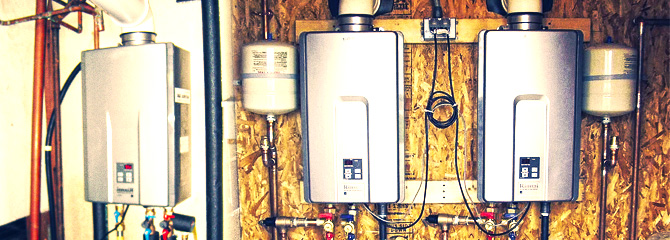Tankless hot water heater installations have been all the rage in residential plumbing ever since they hit the market a few years ago. They were initially reported to offer tremendous savings in energy, which sounded great from both an environmental and a cost viewpoint. The reality might not be quite the same, however, so we did a comparison of the pros and cons, but we suggest you consult with your plumber in Toronto so you can make up your own mind.
Pros
1. They use less space. One of the problems with traditional hot water heaters is the amount of space it takes up that could be used for something else. In most Toronto homes space is at a premium, and a huge tank of water sitting in your basement is little more than an inconvenience, especially when you want to finish the basement and turn it into usable space. A tankless hot water heater is roughly the size of a desktop computer tower. It requires much less floor space and can be wall mounted if necessary.
You don’t spend money keeping water hot. Regular hot water heaters run almost constantly to keep the water in the tank hot and to heat up the cold water that flows in every time you run some of the hot water out. This takes a fair amount of energy, which is used even while you’re sleeping or not at home. The tankless hot water heater produces on-demand, so you only use energy as you need it. What’s more, you never end up with a cold shower because the water is heated as you need it.
They last for a long time. The lifespan of a regular tank-style water heater is between 10 and 15 years. Manufacturers of tankless hot water heaters, however, estimate the units will last up to 20 years. That’s great if you’re planning to live in the same home for that kind of duration, because chances are good you won’t have to worry about replacing the unit while you’re there. Conversely, even if you’re not intending to stay that long, it’s a good investment in your home and is likely to benefit you in terms of resale value.
You’re reducing your environmental footprint. Tankless hot water heaters are manufactured according to all the latest environmental research, so they’re generally very energy-efficient and carbon-friendly. You might still be using energy, but by installing one of these units you’ll be maximizing the value of the energy you consume. This reduces your overall carbon footprint, so if environmental issues are important to you then tankless is the way to go for a greener home.
Cons
1. They are expensive to install. A tankless hot water heater is complex to install and can’t simply be slotted into the space left by your traditional unit. Often, your plumbing contractor will need to install a different method of venting, such as a double-walled pipe that extends through a sidewall. It’s also likely you might need to have a larger gas line and a new 120-volt electrical receptacle installed. Your water pipes may also need to be reconfigured to enable them to transport larger quantities of water simultaneously. All this adds up to substantially higher installation costs than a regular hot water heater.
2. The output is limited. While it’s easy for that large tank of traditionally-heated water to supply multiple delivery points in your home at the same time when you’re heating water as you go for four or more different areas you might find the supply is limited. This makes the tankless hot water heater great for smaller homes with fewer members, but not so attractive for larger households. Given that a smaller household already uses less energy, this tends to negate some of the main benefits.
3. You *might* use MORE energy. This is an unproven hypothesis, but once again it depends on the size of your household and the quantities of hot water you use. If your family regularly uses up the entire tank of hot water at once—say, early in the mornings when everyone’s getting ready for work or school—then producing this quantity of hot water in a limited period could draw a significant amount of power.
We aren’t saying tankless hot water heaters are a bad idea, and they are very likely the way of the future. If you’re considering installing a new unit, consult your local plumber about whether tankless might be practical for your needs.

